Proudly local, universal values
Cultural sovereignty, mother goose, sustainable gastronomy, and the National Olive Festival, what does it all mean?
Nico Dingemans
last updated: Nov 18,2023

Of the many food cultures I lived and worked in as a food writer and former
hotelier, I can now honestly say that Jordan’s cuisine is one of the most
inclusive and meaningful cuisines in the World. But also, an underrated one. اضافة اعلان
A hidden culinary gem
Shaped by ancient trade routes that linked the East to the Mediterranean port of Gaza, at the crossroads of Asia, Africa, and Europe, and nestled in the heart of the Fertile Crescent (the birthplace of agriculture), Jordan’s food culture is steeped in history and a rich diversity of seasonal harvests in winter, spring, summer, and fall. In the summer of 2019, I relocated from the Caribbean to Amman that became my serendipitous safe haven.

Photo: Jude Al Safadi – Tatreez Dessert by Chef Aya Alqour
My journeys through Jordan’s valleys, mountains, and deserts, dining my way through the capital, and cooking and eating with northern villagers and southern fishermen, gave me a deep appreciation of the land aptly described as “A Culinary Museum of the Near Eastern Man” by the late Cecil Hourani in his masterpiece Jordan, the Land & the Table. A hidden culinary gem.
Kingdom of timeThis is the Land of the Shepherds where the world’s oldest bread (13,000 years) and one of the first farming villages (Ain Ghazal) was discovered. Fig trees were domesticated in the Jordan Valley 6,500 years ago and Arab botanicals and wild plants such as Nigella, Sumac, Za’atar, Mountain Herbs, and Olive Oil are still used today in Traditional Arabic Islamic Medicine (TAIM).
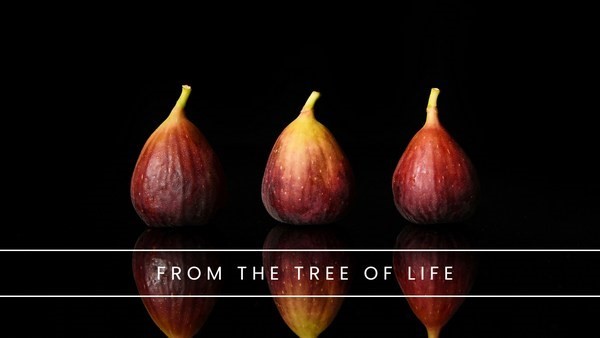
(Photo: HIH – Fig trees were domesticated in the Jordan Valley 6,500 years ago)
Research conducted by Dr. Nizar Haddad at the National Agricultural Research Centre proves that the historical olive cultivar Mehras, the name given to large Rumi olive trees, is one of the oldest genotypes of olive trees in the Mediterranean. According to olive oil specialist Dr. Simon Poole, Extra Virgin Olive Oil from the Levant tells the story of the original superfoods, laying the earliest foundations of today’s Mediterranean Diet. This historical tapestry is woven into the fabric of Jordan, a Kingdom of Time.
Mother Goose – Bilad Al Sham
Blending Bedouin and urban influences, Jordan’s food culture is rooted in the cuisine of the Levant, a region known in Arabic as the Bilad Al Sham that covered Palestine, Jordan, Syria, Lebanon, Cyprus, and parts of southern Turkey. But the layers of Jordan’s culinary identity run much deeper: its culinary DNA is influenced by major ancient cultures that ruled the Levant over the past 5,000 years.
Under Ottoman rule, Arab Bedouin tribes from Syria and the Hejaz migrated to what was then known as Transjordan and in the late 19th century people from the Caucasus found refuge here, adding Circassian, Chechen, Druze, and Armenian dishes to Jordan’s eclectic cuisine. This relatively young Arab nation, influenced by diverse ancient cultures and waves of migration, harbors stories of agricultural heritage, co-habitation, inclusion, and culinary evolution.
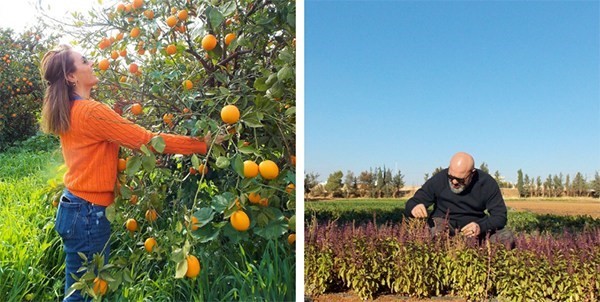
from left to right
(Photo: HIH – Chef Maisa Miqdadi picking oranges in Jerash)
(Photo: HIH – Chef Moeen AbuZaid in the lavender field in southern Amman)
I learned to appreciate Jordan as an eclectic gastronomic Mother Goose that welcomes local, regional, and migrated flavors. As Hourani wrote, this hospitable destination embodies “the pluralism and variety of Jordanian society; and an openness to the outside world which hopefully heralds the return of Jordan to a central role in the evolution of the Near and Middle East.”
Transcend locality
Why is this relevant now? And why is a Dutch foodie writing about Jordanian cuisine? For two reasons: cultural sovereignty and universality. Loss is a sobering phenomenon; it makes humans re-evaluate what we hold dear and look for the good. Amid the devastating events in Gaza and the physical and cultural survival of Palestine, calls for boycotts and to buy local are taking effect. Boycotting is a power move but shifting to local also strengthens identity, solidarity, and long-term socio-economic impact.
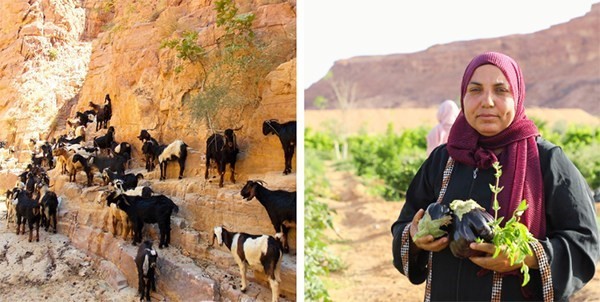
from left to right
(Photo: HIH – a flock of goats in the siq of Wadi Numeira, a hidden hike trail)
(Photo: HIH – Khetam Al Hasanat cultivates edible flowers, herbs, and vegetables on her farm in Wadi Rum)
Cultural sovereignty and cuisine are powerful amplifiers. Especially now. What I wish to encourage is for Jordan to emerge as a beacon for preserving culinary heritage and transcend from locality to a culinary paradigm shift. By rediscovering, educating, and embracing regional food cultures, Jordan can lead that change. As a gastronomic Mother Goose Jordan is also the only country in the region that has the demographics, the infrastructure, and the stability to carry the culinary heritage of the Bilad Al Sham into the future. A higher purpose, a culinary revolution.
Universal values
The second reason has to do with the global shift towards ethical consumerism that aligns with the universal call from the culinary world, Slow Food, and the World Tourism Organization (UNWTO) to pivot to sustainable gastronomy. That call was ignited in Peru over a decade ago when nine of the best chefs in the world signed the Lima Declaration and wrote an Open Letter to the chefs of tomorrow about the role and responsibilities of the chef in relation to nature, knowledge, and values.
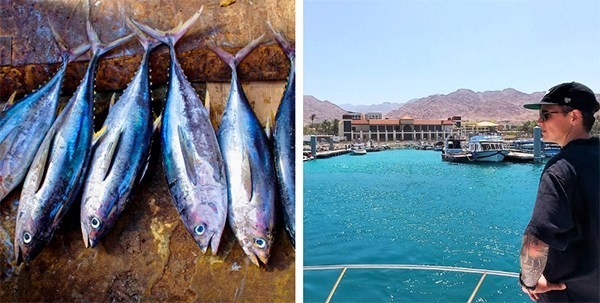
from left to right
(Photo: HIH - Bonito and Skipjack Tuna from the Red Sea are line-caught by the fishermen of Aqaba
(Photo: HIH - Dutch Michelin star chef Syrco Bakker in front of the soon-to-open fish market in Aqaba
Culture, identity, locality, and socio-economic development are key components in that declaration. I wrote about this during the pandemic in an article about Healthy and Responsible menus.
My own From Farm to Fork mission propelled after organizing Health Cuisine events with leading chefs like three-star Michelin chef Massimo Bottura (Nr. 1 of The World’s 50 Best Restaurants 2016) who states that “Culture is the Main Ingredient of the Future”, and two-star Michelin chef Heinz Reitbauer (Nr. 10 of The World’s 50 Best Restaurants 2017) who won the 1st Slow Food UK Award. Slow Food (Bra, Italy) is a global movement involving millions of people in over 160 countries, working to ensure everyone has access to good, clean, and fair food with events and projects such as Terra Madre, Slow Food Travel, and the Ark of Taste.
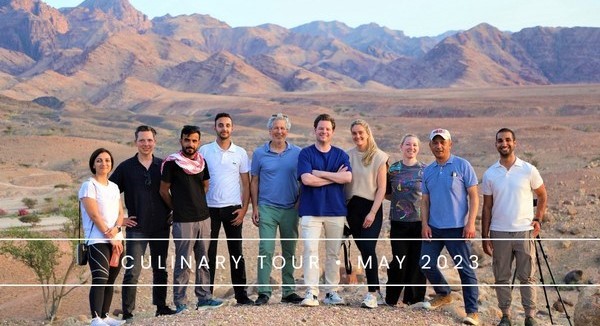
Photo: HIH - Michelin chefs and Food writers visit Feynan Ecolodge in Dana Biosphere Reserve)
Slow Food was included in my previous books and with the team in Bra we´ll do the same with the 4th publication From Farm to Fork in Jordan (Spring 2024) by featuring some of the 32 Jordanian Ark of Taste products and 11 Palestinian Ark of Taste products such as Loof, Nabawi Barley, Akkoub, Arbood, Khabeesa, Jareesheh, Za’atar, Samneh Baladi, Figs, and of course Jameed and Olive Oil. The book will feature 48 dishes, 24 local chefs, and local ingredients from all 12 governorates. The culinary map of Jordan.
Back to the roots
Reflecting on the 8th UNWTO World Forum on Gastronomy Tourism I attended in San Sebastián last October, the theme "Back to the Roots" resonates. Sourcing more locally, respecting rural communities, facilitating small-scale producers, preserving culinary heritage, enhancing authenticity, and educating tourism professionals, farmers, as well as local and international guests are universal values. Destinations need a gastronomy tourism strategy, and we need to go back to the roots - starting with bringing chefs and producers together.
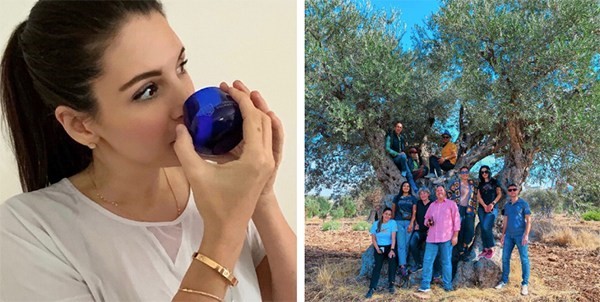
from left to right
(Photo: HIH - Olive Oil sommelier Amelia Bilbeisi works in her family business Maida Olive Oil
(Photo: HIH - Olive Farm Tour in Ajloun with chef Samar from Madaba, chef Maisa from Amman, and chef Francesco from Four Seasons
We made a head-start three years ago with farm tours and From Farm to Fork dinners with 100% local 100% seasonal menus. The past year we also invited seven Michelin chefs and four food writers on different culinary tours in partnership with the Jordan Tourism Board. We visited Irbid, Ajloun, Amman, Madaba, Wadi Dana, Wadi Rum, and Aqaba and met with local farmers, fishermen, women´s associations, and the visiting chefs also cooked alongside Jordanian chefs. The reviews of our visitors were overwhelmingly positive, calling their experiences in Jordan a “culinary revelation”.
National Olive FestivalDuring our first culinary tour we visited the 22nd National Olive Festival and Rural Products Exhibition in Mecca Mall with leading chefs from Canada, The Netherlands, and Jordan. It was inspiring and fun as the festival offers a platform to meet rural producers, making it a great opportunity to (re)discover culinary heritage and support local businesses. The 23rd National Olive Festival takes place from November 23 to December 2. World Olive Tree Day is on November 26 of each year and a day to reflect on peace, wisdom, and harmony. We invited chefs, hoteliers, restaurant owners, and tourism professionals in Jordan to visit the festival on this symbolic day in solidarity with Gaza and to support local. Another good way to rediscover Jordanian cuisine is to read previous and new articles brought to you by Jordan News and From Farm to Fork in Jordan in a new lifestyle section that sheds more light on sustainable gastronomy, responsible tourism, culinary heritage, and local producers.
For more related content click here.
Read more Around Jordan
Jordan News
A hidden culinary gem
Shaped by ancient trade routes that linked the East to the Mediterranean port of Gaza, at the crossroads of Asia, Africa, and Europe, and nestled in the heart of the Fertile Crescent (the birthplace of agriculture), Jordan’s food culture is steeped in history and a rich diversity of seasonal harvests in winter, spring, summer, and fall. In the summer of 2019, I relocated from the Caribbean to Amman that became my serendipitous safe haven.

Photo: Jude Al Safadi – Tatreez Dessert by Chef Aya Alqour
My journeys through Jordan’s valleys, mountains, and deserts, dining my way through the capital, and cooking and eating with northern villagers and southern fishermen, gave me a deep appreciation of the land aptly described as “A Culinary Museum of the Near Eastern Man” by the late Cecil Hourani in his masterpiece Jordan, the Land & the Table. A hidden culinary gem.
Kingdom of timeThis is the Land of the Shepherds where the world’s oldest bread (13,000 years) and one of the first farming villages (Ain Ghazal) was discovered. Fig trees were domesticated in the Jordan Valley 6,500 years ago and Arab botanicals and wild plants such as Nigella, Sumac, Za’atar, Mountain Herbs, and Olive Oil are still used today in Traditional Arabic Islamic Medicine (TAIM).

(Photo: HIH – Fig trees were domesticated in the Jordan Valley 6,500 years ago)
Research conducted by Dr. Nizar Haddad at the National Agricultural Research Centre proves that the historical olive cultivar Mehras, the name given to large Rumi olive trees, is one of the oldest genotypes of olive trees in the Mediterranean. According to olive oil specialist Dr. Simon Poole, Extra Virgin Olive Oil from the Levant tells the story of the original superfoods, laying the earliest foundations of today’s Mediterranean Diet. This historical tapestry is woven into the fabric of Jordan, a Kingdom of Time.
Mother Goose – Bilad Al Sham
Blending Bedouin and urban influences, Jordan’s food culture is rooted in the cuisine of the Levant, a region known in Arabic as the Bilad Al Sham that covered Palestine, Jordan, Syria, Lebanon, Cyprus, and parts of southern Turkey. But the layers of Jordan’s culinary identity run much deeper: its culinary DNA is influenced by major ancient cultures that ruled the Levant over the past 5,000 years.
Under Ottoman rule, Arab Bedouin tribes from Syria and the Hejaz migrated to what was then known as Transjordan and in the late 19th century people from the Caucasus found refuge here, adding Circassian, Chechen, Druze, and Armenian dishes to Jordan’s eclectic cuisine. This relatively young Arab nation, influenced by diverse ancient cultures and waves of migration, harbors stories of agricultural heritage, co-habitation, inclusion, and culinary evolution.

from left to right
(Photo: HIH – Chef Maisa Miqdadi picking oranges in Jerash)
(Photo: HIH – Chef Moeen AbuZaid in the lavender field in southern Amman)
I learned to appreciate Jordan as an eclectic gastronomic Mother Goose that welcomes local, regional, and migrated flavors. As Hourani wrote, this hospitable destination embodies “the pluralism and variety of Jordanian society; and an openness to the outside world which hopefully heralds the return of Jordan to a central role in the evolution of the Near and Middle East.”
Transcend locality
Why is this relevant now? And why is a Dutch foodie writing about Jordanian cuisine? For two reasons: cultural sovereignty and universality. Loss is a sobering phenomenon; it makes humans re-evaluate what we hold dear and look for the good. Amid the devastating events in Gaza and the physical and cultural survival of Palestine, calls for boycotts and to buy local are taking effect. Boycotting is a power move but shifting to local also strengthens identity, solidarity, and long-term socio-economic impact.

from left to right
(Photo: HIH – a flock of goats in the siq of Wadi Numeira, a hidden hike trail)
(Photo: HIH – Khetam Al Hasanat cultivates edible flowers, herbs, and vegetables on her farm in Wadi Rum)
Cultural sovereignty and cuisine are powerful amplifiers. Especially now. What I wish to encourage is for Jordan to emerge as a beacon for preserving culinary heritage and transcend from locality to a culinary paradigm shift. By rediscovering, educating, and embracing regional food cultures, Jordan can lead that change. As a gastronomic Mother Goose Jordan is also the only country in the region that has the demographics, the infrastructure, and the stability to carry the culinary heritage of the Bilad Al Sham into the future. A higher purpose, a culinary revolution.
Why is this relevant now? And why is a Dutch foodie writing about Jordanian cuisine? For two reasons: cultural sovereignty and universality. Loss is a sobering phenomenon; it makes humans re-evaluate what we hold dear and look for the good. Amid the devastating events in Gaza and the physical and cultural survival of Palestine, calls for boycotts and to buy local are taking effect. Boycotting is a power move but shifting to local also strengthens identity, solidarity, and long-term socio-economic impact. Cultural sovereignty and cuisine are powerful amplifiers. Especially now. What I wish to encourage is for Jordan to emerge as a beacon for preserving culinary heritage and transcend from locality to a culinary paradigm shift.I hope you will arrive to the same conclusion once you have eaten your way through Jordan's seasons and micro-climates, and once you have had the chance to meet or read about the anthropologists, historians, ums and babas, restaurant chefs, home-cooks, generational farmers, artisans, botanists, hikers, foragers, fishermen, herbalists, and what have you - preservationists of the culinary heritage of Jordan and the Levant.
Universal values
The second reason has to do with the global shift towards ethical consumerism that aligns with the universal call from the culinary world, Slow Food, and the World Tourism Organization (UNWTO) to pivot to sustainable gastronomy. That call was ignited in Peru over a decade ago when nine of the best chefs in the world signed the Lima Declaration and wrote an Open Letter to the chefs of tomorrow about the role and responsibilities of the chef in relation to nature, knowledge, and values.

from left to right
(Photo: HIH - Bonito and Skipjack Tuna from the Red Sea are line-caught by the fishermen of Aqaba
(Photo: HIH - Dutch Michelin star chef Syrco Bakker in front of the soon-to-open fish market in Aqaba
Culture, identity, locality, and socio-economic development are key components in that declaration. I wrote about this during the pandemic in an article about Healthy and Responsible menus.
My own From Farm to Fork mission propelled after organizing Health Cuisine events with leading chefs like three-star Michelin chef Massimo Bottura (Nr. 1 of The World’s 50 Best Restaurants 2016) who states that “Culture is the Main Ingredient of the Future”, and two-star Michelin chef Heinz Reitbauer (Nr. 10 of The World’s 50 Best Restaurants 2017) who won the 1st Slow Food UK Award. Slow Food (Bra, Italy) is a global movement involving millions of people in over 160 countries, working to ensure everyone has access to good, clean, and fair food with events and projects such as Terra Madre, Slow Food Travel, and the Ark of Taste.

Photo: HIH - Michelin chefs and Food writers visit Feynan Ecolodge in Dana Biosphere Reserve)
Slow Food was included in my previous books and with the team in Bra we´ll do the same with the 4th publication From Farm to Fork in Jordan (Spring 2024) by featuring some of the 32 Jordanian Ark of Taste products and 11 Palestinian Ark of Taste products such as Loof, Nabawi Barley, Akkoub, Arbood, Khabeesa, Jareesheh, Za’atar, Samneh Baladi, Figs, and of course Jameed and Olive Oil. The book will feature 48 dishes, 24 local chefs, and local ingredients from all 12 governorates. The culinary map of Jordan.
Back to the roots
Reflecting on the 8th UNWTO World Forum on Gastronomy Tourism I attended in San Sebastián last October, the theme "Back to the Roots" resonates. Sourcing more locally, respecting rural communities, facilitating small-scale producers, preserving culinary heritage, enhancing authenticity, and educating tourism professionals, farmers, as well as local and international guests are universal values. Destinations need a gastronomy tourism strategy, and we need to go back to the roots - starting with bringing chefs and producers together.

from left to right
(Photo: HIH - Olive Oil sommelier Amelia Bilbeisi works in her family business Maida Olive Oil
(Photo: HIH - Olive Farm Tour in Ajloun with chef Samar from Madaba, chef Maisa from Amman, and chef Francesco from Four Seasons
We made a head-start three years ago with farm tours and From Farm to Fork dinners with 100% local 100% seasonal menus. The past year we also invited seven Michelin chefs and four food writers on different culinary tours in partnership with the Jordan Tourism Board. We visited Irbid, Ajloun, Amman, Madaba, Wadi Dana, Wadi Rum, and Aqaba and met with local farmers, fishermen, women´s associations, and the visiting chefs also cooked alongside Jordanian chefs. The reviews of our visitors were overwhelmingly positive, calling their experiences in Jordan a “culinary revelation”.
National Olive FestivalDuring our first culinary tour we visited the 22nd National Olive Festival and Rural Products Exhibition in Mecca Mall with leading chefs from Canada, The Netherlands, and Jordan. It was inspiring and fun as the festival offers a platform to meet rural producers, making it a great opportunity to (re)discover culinary heritage and support local businesses. The 23rd National Olive Festival takes place from November 23 to December 2. World Olive Tree Day is on November 26 of each year and a day to reflect on peace, wisdom, and harmony. We invited chefs, hoteliers, restaurant owners, and tourism professionals in Jordan to visit the festival on this symbolic day in solidarity with Gaza and to support local. Another good way to rediscover Jordanian cuisine is to read previous and new articles brought to you by Jordan News and From Farm to Fork in Jordan in a new lifestyle section that sheds more light on sustainable gastronomy, responsible tourism, culinary heritage, and local producers.
For more related content click here.
Read more Around Jordan
Jordan News

